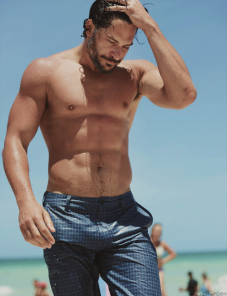My celebrity crush released a fitness book about a month ago.
Oh, all right. My celebrity crush is Joe Manganiello. But, I mean!!! Can you blame me? Look at that smile!
Just LOOK at it!
Not to mention the rest of him…

 Anyway. My point. About a month ago, Joe released a fitness book, which has been doing quite well, with reason. I own two copies. I’ve read it twice. And not only does he give some straightforward, no-holds-barred on fitness and body-building, he also talks a lot about overcoming barriers to motivation and other things that are useful on many levels, not just in the fitness world.
Anyway. My point. About a month ago, Joe released a fitness book, which has been doing quite well, with reason. I own two copies. I’ve read it twice. And not only does he give some straightforward, no-holds-barred on fitness and body-building, he also talks a lot about overcoming barriers to motivation and other things that are useful on many levels, not just in the fitness world.
As you might expect, there have been a lot of people tweeting #Evolution since the book hit the shelves. Mr. Manganiello retweets a fair number of these posts, and he seems to take particular delight in sharing the ones where people are talking about how the workouts in the book have changed their lives. A large number of these mention being in a huge amount of pain from people pushing themselves to go beyond what they’d accomplished before.
Yesterday I tweeted a comment on this phenomenon, because I find all these retweets amusing on a perverse level. And I added, “I get it, though. Pain means you’re doing the work.”
After I pressed “send,” though, I wondered if I truly believed that. And it got me thinking about pain and the different things it means. See, I’ve spent a large portion of my life dealing with pain that hasn’t meant anything of the kind. Emotional pain from trauma and chronic depression. Physical pain from migraines. Neither of those kinds of pain indicate that I’m doing any kind of work at all. They just exist. They’re like alien invaders to my body and psyche, things I just have to wait out, breathe through, and hope they go away.
There’s the pain of rejection and the pain of injuries. There’s the pain that comes from a friend’s betrayal, from when something just isn’t right in a relationship. There’s the pain you cope with after a major surgery, and the pain of fighting a debilitating disease. I’ve read before that pain is a sign of something wrong and you shouldn’t ignore it, and I believe that. Pain means something needs to change, and sometimes you have the power to change it and sometimes you don’t.
But change itself is painful, almost always. Ending a bad relationship and moving on. Conquering a fear, conquering an addiction. Deciding to distance yourself from an abusive family or friend when everyone around you preaches compassion and forgiveness. Having a cancerous organ removed. Working to change your body and/or adopt a healthier lifestyle. All of these actions can be seen as positive (I say “can be” because there are people who will undoubtedly argue the last point). Yet they still hurt. And my experience is, there isn’t even much qualitative difference in the WAY they hurt. On some level, pain is pain.
So how do you know when it’s good pain and when it’s bad pain? And more important, how do you keep from dismissing someone’s bad pain with sententious garbage like positive thinking mantras and similar bullshit? Society has it in for pain. It makes people uncomfortable. They don’t want to be around it. They want it to go away. They want to say things like, “Pain means you’re doing the work” whether or not it’s true.
Sometimes it’s easy to know the difference. When I sat down to clean the bathroom cabinets the other day and rammed my back into the toilet with the force of a rock hurled from a trebuchet, that was bad pain. I didn’t need the subsequent inability to walk straight to tell me I had injured myself (It’s getting better, slowly).
Sometimes it’s not so easy to know Personal example: I’m working hard on coming out from under my rock and being more social, more open. I’m trying to make contact with other people in writing and people in publishing, trying to gain more acceptance as a writer. This is one of the hardest things I have ever done. It goes against my grain and against my conditioning to think of myself as wrong and inadequate, to stay out of the light and keep my mouth shut. It’s painful, and all my instincts are screaming at me to back away and stop doing this insane thing. Yet I’m fairly sure I’m working toward a positive change.
When you take up a new activity, your body hurts. When I was in college, every time I went back into the dance studio after a semester break I hurt all over for about a week. Sometimes I had to go down stairs backwards because my calves were in so much pain from doing plié/relevé sequences. I’ll spare you the details about how muscle-building works and just say that’s normal. I kept at it and got over it.
But then, I had teachers who were invested in dancing in ways that don’t damage the body. In the dance world, not all are. Some schools promote pain for pain’s sake, because the human body really isn’t meant to do the things those schools want their dancers to do. I know ballerinas who are in pain all the time, who take bleeding feet as a matter of course. Myself, I’d say that’s bad pain, something you need to find a way to stop, particularly if you don’t want to be crippled by the time you’re thirty.
I see the same thing in the diet/fitness industry. Despite claims to the contrary, I honestly do not believe everyone can achieve the same kind of body, the same kind of muscularity, the same muscle-to-fat ratio. We’re just not all designed the same, nor do we all have the same desires for our bodies, and that’s fine. Lots of prominent people in the fitness world would agree with me, I think. At least, in the January 2014 issue of Muscle and Fitness, editor Shawn Perrine talks about learning he didn’t have the right body type to build like Schwarzenegger, and adapting to his training to suit his more gymnast-like physique. But we still hear that we can all achieve that perfect body if we just work hard enough. And I have to wonder, how many people are working to the point of bad pain in the hopes of achieving an impossible goal?
Honestly, I have no answers to any of these questions. It’s just, my post the other day got me thinking and asking the questions, the way I do.
How do you tell the difference between good pain and bad pain? I’d love to hear from you.



I agree with you, pain accompanies a lot of different experiences and what it “means” is not simple. In a way I think focusing on whether the pain is good or bad can be a distraction. Maybe it’s better to focus on the overall experience and if it seems to be overall more damaging than positive, think about whether there’s any action that might shift it.
I don’t spend much time reading fitness writing, but the last time I looked at any I was amused at how no fitness writing about pain discusses the fact that many people enjoy experiencing pain in controlled circumstances, and I have no doubt that plenty of “exercising through pain” is taking advantage of that feature. Personally I think it’s a fun feature, but it doesn’t confer moral superiority.
Good web site you’ve got here.. It’s difficult to find high quality
writing like yours nowadays. I really appreciate individuals like you!
Take care!!